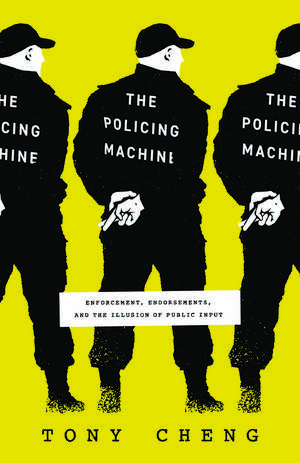The Policing Machine: Enforcement, Endorsements, and the Illusion of Public Input
Autor Tony Chengen Limba Engleză Paperback – 13 dec 2023
The past few years have seen Americans express passionate demands for police transformation. But even as discussion of no-knock warrants, chokeholds, and body cameras has exploded, any changes to police procedures have only led to the same outcomes. Despite calls for increased accountability, police departments have successfully stonewalled change.
In The Policing Machine, Tony Cheng reveals the stages of that resistance, offering a close look at the deep engagement strategies that NYPD precincts have developed with only subsets of the community in order to counter any truly meaningful, democratic oversight. Cheng spent nearly two years in an unprecedented effort to understand the who and how of police-community relationship building in New York City, documenting the many ways the police strategically distributed power and privilege within the community to increase their own public legitimacy without sacrificing their organizational independence. By setting up community councils that are conveniently run by police allies, handing out favors to local churches that will promote the police to their parishioners, and offering additional support to institutions friendly to the police, the NYPD, like police departments all over the country, cultivates political capital through a strategic politics that involves distributing public resources, offering regulatory leniency, and deploying coercive force. The fundamental challenge with police-community relationships, Cheng shows, is not to build them. It is that they already exist and are motivated by a machinery designed to stymie reform.
| Toate formatele și edițiile | Preț | Express |
|---|---|---|
| Paperback (1) | 123.50 lei 3-5 săpt. | +10.65 lei 7-13 zile |
| University of Chicago Press – 13 dec 2023 | 123.50 lei 3-5 săpt. | +10.65 lei 7-13 zile |
| Hardback (1) | 578.52 lei 6-8 săpt. | |
| University of Chicago Press – 8 ian 2024 | 578.52 lei 6-8 săpt. |
Preț: 123.50 lei
Nou
Puncte Express: 185
Preț estimativ în valută:
23.64€ • 24.49$ • 19.72£
23.64€ • 24.49$ • 19.72£
Carte disponibilă
Livrare economică 28 februarie-14 martie
Livrare express 14-20 februarie pentru 20.64 lei
Preluare comenzi: 021 569.72.76
Specificații
ISBN-13: 9780226830650
ISBN-10: 0226830659
Pagini: 240
Ilustrații: 11 halftones, 5 tables
Dimensiuni: 140 x 216 x 18 mm
Greutate: 0.28 kg
Ediția:First Edition
Editura: University of Chicago Press
Colecția University of Chicago Press
ISBN-10: 0226830659
Pagini: 240
Ilustrații: 11 halftones, 5 tables
Dimensiuni: 140 x 216 x 18 mm
Greutate: 0.28 kg
Ediția:First Edition
Editura: University of Chicago Press
Colecția University of Chicago Press
Notă biografică
Tony Cheng is assistant professor in the Department of Sociology at Duke University.
Cuprins
Introduction. The Machinery of Police-Community Relations
1. Channeling Heterogeneous Demands
2. Cultivating Local Constituents
3. Distributing Power and Privilege
4. Inducing Public Endorsements
5. Resisting the Policing Machine
Conclusion. From Machine to Movement
Acknowledgments
Notes
References
Index
1. Channeling Heterogeneous Demands
2. Cultivating Local Constituents
3. Distributing Power and Privilege
4. Inducing Public Endorsements
5. Resisting the Policing Machine
Conclusion. From Machine to Movement
Acknowledgments
Notes
References
Index
Recenzii
“A brilliant analysis of the mechanisms the NYPD uses to cultivate political power. If Skogan and Hartnett’s Community Policing, Chicago Style was the must-read book on neighborhood policing of the twentieth century, I predict Cheng’s contribution will be the must-read book on the topic of the twenty-first."
“The Policing Machine shows that the public acceptance of police is not an inevitability created by lack of alternatives for public safety, but the product of a complex apparatus of consent and coercion that helps constitute the very public police purport to serve and protect.”
"The Policing Machine is the most important study of policing I’ve ever read. It applies a crucial relational and institutional analysis of community policing in New York City from an independent perspective. Cheng’s emphasis on de-monopolizing policing’s role in public safety offers a useful way forward for anyone seeking to bring serious change to city approaches to public safety."
"This title about police departments will appeal to concerned citizens and policy makers."
"A hard-hitting exposé of the organizational structures and political maneuvering that thwart police reform."
"Cheng’s book is a sharp and well-documented attempt to unveil the specific mechanisms by which the NYPD selects local input that is functional to its organisational purposes."
"A comprehensive illustration of the mechanisms that the NYPD uses to cultivate political power."
